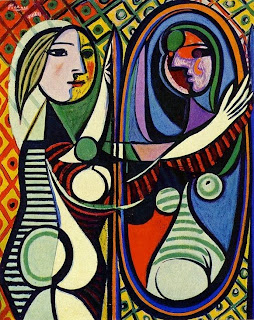
(Pablo Picasso, "Girl Before a Mirror", 1932)
Psalm 18:26:
"With the pure you show yourself pure; and with the crooked you show yourself perverse."
It all started this morning when I was brushing my teeth. I was looking in the bathroom mirror and had the sudden realization that when you look in a mirror, you don't see yourself--you see yourself, backwards. You see everything behind you, but nothing in front of you. Mirrors are not all that useful when we think about what lies ahead. Great for reflecting on what is behind us, though.
Then as I sat down with my morning habit of "The Daily Office" and my systematic, monastic run-through of the Psalms, what should be part of my reading but this tidbit in Psalm 18? (That's the trouble about the habit of regular Bible reading...it leads to thinking. Imagine that.)
As I sat with that thought, what bubbled up was a realization that we DO tend to reflect what surrounds us. If we surround ourselves with abundance and generosity, we tend to reflect those values. If we surround ourselves with the tools of self-absorption, we tend to reflect a self-absorbing nature.
Yet, things bigger than ourselves tend to influence what others see and reflect, themselves. I sat with my coffee, and pondered backwards. Although I could not tell you at what point this shift occurred, somewhere in that process of my becoming a physician, there was a day that I somehow stopped worrying about who I was to become--to "be"-- and thought more about "What do I want to reflect to others?"--and in that process I began to become that person. My best guess is it started to happen at some point when I realized medical students are apt mimics of their residents and attendings--for better or worse. But I remember thinking way back when, somewhere back there, I became cognizant of the fact I wanted them to mimic the good parts of me. It might have even happened when I caught one mimicking something I'd rather they not mimic in me.
I imagine many parents go through the same thing. A day comes when many parents realize that it's important for their children to see parents who reflect the values they want their children to embody. It's a day when they stop reacting and start consulting with their spouse about how to project that image. As that happens, parents mature, and relationships mature.
So it is with the "holy habits" we take on as we recognize regular spiritual disciplines are a part of being in relationship with God--things like regular prayer or meditation time, Bible reading, keeping a prayer list, etc. In the beginning, we take them on because we think we are going to "become something" as a result of the habit--that this somehow will make us more in tune with God. But over time, we come to realize God was in relationship with us all along, and it's no longer to "please" God, catch God's attention, etc. It is more to create a milieu that others can see when THEY are needing to see God's kingdom.
My EfM mentor often has described her experience of having survived a scary time on the ventilator as a result of surviving an often fatal pulmonary disorder called Bronchiolitis Obliterans--Organizing Pneumonia (BOOP.) She knew many people were praying for her, and in her mind, she could see a "net." Part of the process she trusted in her own ability to trust God, no matter what the outcome was to be, was to "lean into that net." She has described how she came to understand she was to lean into this net, that it was not about the net having particular power to control whether she lived or died, but simply that she was to learn to trust its power.
When I think back to this recent article I read, where Fr. Ron Rolheiser describes what he believes to be the ten major faith struggles of our age, it makes me realize that conventional notions of evangelism are like us looking in the mirror--us, backwards. To me, evangelism has far less to do with me personally, or my efforts, as it does to be a part that maintains that "net."
Yes, our holy habits shape what we reflect to others to some degree, and that reflection can be part of what others see as they search for what Rolheiser describes as the four great spiritual yearnings people most seek--a personal morality, social justice, mellowness of heart and spirit, and community as a constituent element of true worship. More importantly, our holy habits shape and maintain the net--it's not so much about "us" as we might think.
No comments:
Post a Comment